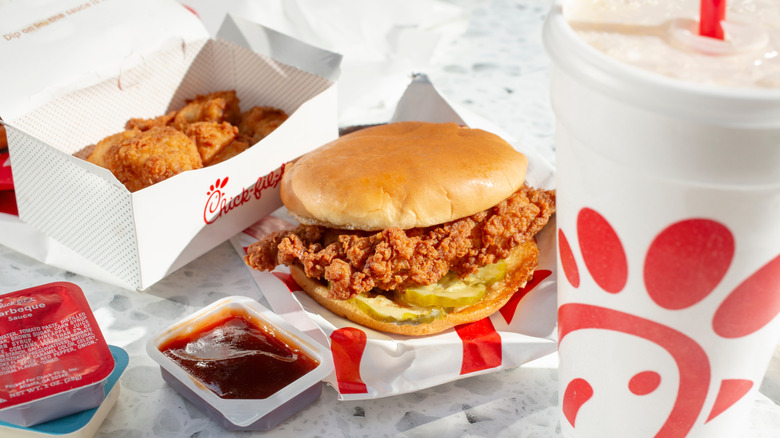How Much A Chick-Fil-A Franchisee Can Make In A Year
With entrepreneurship on the rise, especially in the post-COVID era, would you become a franchisee for Chick-fil-A if given the opportunity? For many, the answer to that question depends on how much money is in it.
Chick‑fil‑A's unique business model means operators pay just $10,000 upfront, which is a stunning difference compared to other quick service restaurant (QSR) chains, where a $45,000 franchise fee is not unusual for QSRs like McDonald's. Startup costs for these other chains begin in the millions, while the starting range for Chick-fil-A is a little over half a million. However, Chick-fil-A's low entry cost does not translate into full ownership. The company retains control over restaurant assets, such as real estate and equipment.
In plain numbers, the average Chick‑fil‑A restaurant racks up around $8.7 million to $9.3 million in annual revenue, with a portion of it going toward fees, including 15% of gross sales, 50% of net profit, and capped rent at 6% of sales. Operators typically keep between 5% and 7% of total revenue, working out to about $465,000 per year if the location performs at least average, which could very well not be the case. Some Reddit users estimate average annual take-home earnings closer to $150,000, though higher-performing operators can net between $200,000 and $300,000 depending on performance and local efficiency. Essentially, it depends on your individual performance, but this gives you an idea of what you can maybe expect.
Why that take-home pay is anything but passive income
Since the compensation is heavily tied to the store's performance, owning a Chick‑fil‑A franchise is not what you would consider passive income. Operators work long hours and are expected to be deeply engaged in daily operations. The upside is a low-risk setup — the franchisor handles the restaurant's real estate, construction, and operations support, allowing operators to focus almost entirely on management and execution.
Yet, there's still a trade-off even with that benefit because Chick‑fil‑A retains ownership of the physical assets, so there's no equity to build or pass down. Once your contract ends, you walk away with none of the tangible investment tied to the restaurant. For many, Chick‑fil‑A is more akin to "buying a high-paying job" than investing in a business asset.
That active involvement and profit structure mean working in and on the restaurant becomes a lifestyle — not a side income. It offers an income that's lucrative but tightly bound to performance and daily presence. So, if you're not ready to roll up your sleeves and really get in there, you may not like being a franchisee.
The draw (and the catch) for ambitious entrepreneurs
There's no question that Chick‑fil‑A is a rare, high-reward opportunity in the franchise world. Raking in take-home pay that could eclipse half a million dollars is a compelling option for driven entrepreneurs. Add to that a streamlined support system, robust brand loyalty, and the prestige of operating a top-ranked fast-food chain, and it's clear why so many aspire to become franchisees.
It's still important to note that this opportunity comes wrapped in caveats. The franchisee count is highly selective, and only about 75 to 80 operators are chosen out of more than 40,000 applicants each year. You're limited to one location, must be fully hands-on without outside business distractions, and can never sell or transfer the business, even to heirs. In short, Chick-fil-A offers high income for high commitment. For the right person, it's a unique opportunity to earn big, but it's undeniably a choice laden with constraints and responsibility.


